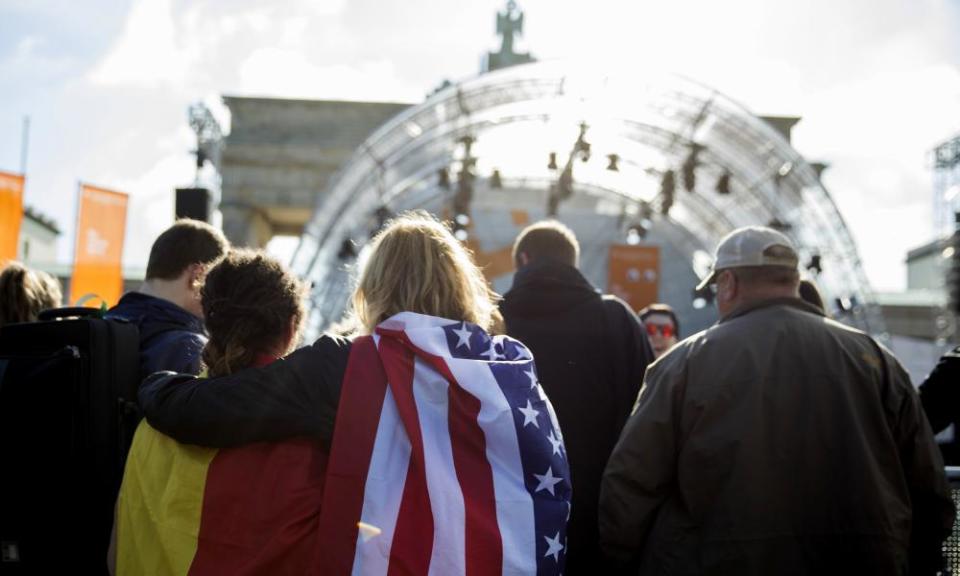Barack Obama tells Berlin audience: ‘We can’t hide behind a wall’
The former US president, Barack Obama, has made a call for international engagement as he told an audience of tens of thousands in Berlin that “we can’t hide behind a wall.”
Obama was discussing democracy and global responsibility with the German chancellor, Angela Merkel, as the country marks the 500th anniversary of the Reformation. It was Obama’s first speaking event in Europe since leaving the White House in January.
At the 18th-century monument in Berlin that has also heard celebrated speeches from Ronald Reagan and Bill Clinton, Obama and Merkel took questions about shaping democracy from a teacher, an actor, a social worker and a student.
After lauding Merkel as someone who had done “outstanding work,” Obama launched a defence of his own presidency and the values of liberal democracy championed by both leaders.
Citing the rise of nationalism and xenophobia in parts of the world, Obama told the crowd that “we have to push back against those trends that would violate human rights or suppress democracy or restrict individual freedoms.”
In questions to both leaders on the refugee crisis, Obama said nation states had a duty to help people in need but also to make clear to their own populations the interconnected nature of the world.
“When we provide development aid to Africa or we are involved in conflict resolution in areas where war has been taking place, we make investments to try to deal with climate change … Those things we do not do just for charity, not just because they are the right thing to do.
“If there are disruptions in these countries, if there is bad governance, if there is war or if there is poverty ... in this new world that we live in, we can’t isolate ourselves,” he said. “We can’t hide behind a wall.”
Obama said he was “heartbroken” by the suicide attack in Manchester on Monday and he and Merkel had sent a a joint message of condolence to the families of those killed.
German Protestant church members and visitors from all over the world crowded a square in front of the Brandenburg Gate amid high security.
In 2008, 200,000 Berliners came to hear Obama – then campaigning for the presidency, and barred by Merkel from speaking at the Brandenburg Gate – tell them: “This city, of all cities, knows the dream of freedom.”
Eight years later, he addressed an invited audience of 6,000 on his final trip to Europe as president, and told the chancellor – whom he described during his term as “my closest international partner” – that she was “on the right side of history”.

Obama and Merkel ended up forging a genuinely close bond during his presidency, finding common ground over issues such as Russia’s annexation of the Crimea, the European financial crisis and the refugee crisis.
Later on Thursday, Merkel will meet Obama’s successor, Donald Trump, when she travels to Brussels for the Nato summit.
While apparently unintentional, the coinciding visits serve to highlight Europe’s radically different view of the two men. A Pew Research Center survey last June found 77% of Europeans had confidence in Obama – and 9% in the man who has now succeeded him.
The Obama Foundation says the invitation from Merkel came before the US election, so the fact that he is in Europe at the same time as Trump is pure coincidence.

 Yahoo News
Yahoo News 
